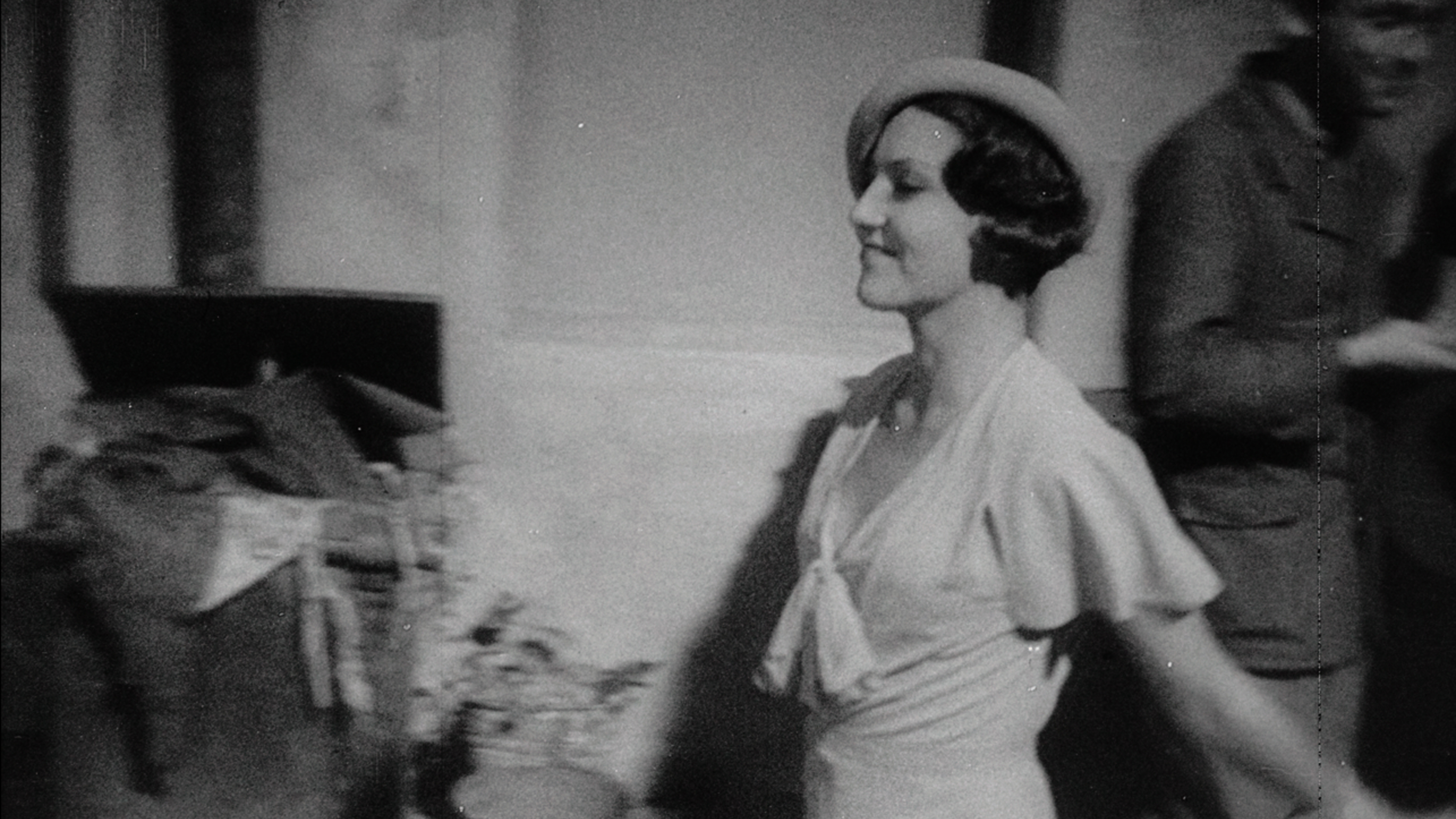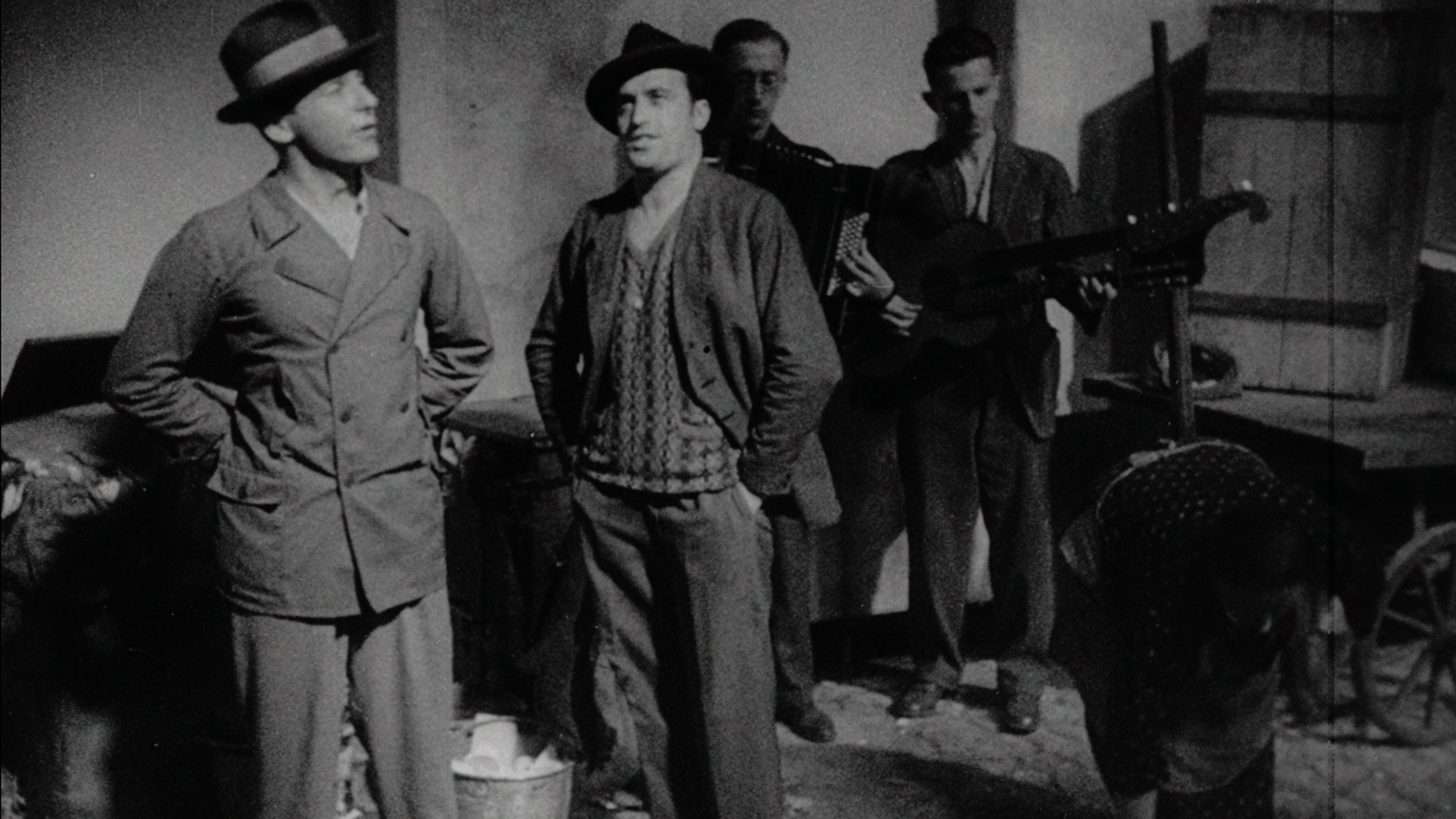I BY DAY, YOU BY NIGHT (1932)



6:00 PM, Thursday April 27
Australian Premiere: Introduced by John McDonald
10:00AM, Tuesday May 02
Randwick Ritz
Director: Ludwig Berger
Country: Germany
Year: 1932
Runtime: 98 minutes
Rating: U15+
Language: German, English subtitles
TICKETS ⟶
Australian Premiere: Introduced by John McDonald
10:00AM, Tuesday May 02
Randwick Ritz
Director: Ludwig Berger
Country: Germany
Year: 1932
Runtime: 98 minutes
Rating: U15+
Language: German, English subtitles
TICKETS ⟶
I BY DAY, YOU BY NIGHT/ ICH BEI TAG UND DU BEI NACHT
AUSTRALIAN PREMIERE OF THE 2K RESTORATION
"One of the crowning glories of the German musical." – Peter von Bagh
"Extremely successful little charmer, an etude in happiness." – Dominik Graf
Produced by Erich Pommer during the late Weimar period when the great UFA studio created commercially and critically successful genre films, this screwball musical comedy tells the story of a manicurist and a waiter who share the same rented bedroom but never meet face to face. They do, however, dislike what they know about each other, but when they finally meet, they both immediately fall in love.
“Two months later the Nazis seized power, so the film with its many participants of Jewish faith disappeared from the cinemas. It is incomprehensible why it took 87 years to be re-released.” — Anonymous
“In the middle of an economic crisis, Ludwig Berger succeeds in reconciling fairy tales with contemporary images and the role of cinema.” — Zeughauskino Deutsches Museum
The 6pm screening on Thursday 27 April will be introduced by John McDonald, film critic for the Australian Financial Review and art critic for the Sydney Morning Herald.
FILM NOTES
By Lukas Foerster
The below notes were written by Lukas Foerster and were first published in the catalogue for Il Cinema Ritrovato 2023 by the Cineteca di Bologna. They are reprinted here by kind permission of the Cineteca di Bologna. Thanks to Guy Borlee for his assistance and Lukas Foerster for his kind permission.
German Musical Comedies 1930-32
Like most other countries, Germany was rapidly won over by sound cinema.
To meet the demands of a growing and changing market, producers looked out for
new talent, and often found it in Berlin’s world-famous cabaret and revue
theatre scene. Among the most successful genres emerging in the early 1930s
were comedies, musicals and, combining both, the specific Ge man genre of Tonfilmlustspiel. Rooted in the operetta
tradition of the 19th century, but adapted to contemporary aesthetics and
mores, these films introduced popular comedians and singers to the movie
audience, while celebrating the urbane, sophisticated, hedonistic modernity of
Weimar culture. For a few precious years, just before the Nazi takeover, a
decidedly light-hearted, sensual, frivolous and uninhibited spirit swept
through German cinemas.
The musical comedies of the late Weimar Republic are swarming with false countesses, tramps and drifters. Policemen and other figures of authority, on the other hand, are mocked constantly, while social, sexual and gender identities are in a constant state of flux.
Even more than other genres of German cinema of the Weimar Republic, the Tonfilmlustspiel is inextricably linked to the work of Jewish directors, screenwriters, producers, composers and actors originating from all over Germany as well as, quite often, Austria, who had found the blossoming cultural metropolis Berlin to be a welcoming place during the 1920s. Almost none of them were able to continue working in Germany after Adolf Hitler’s rise to power, culminating in his chancellorship starting on 30 January, 1933. Directly afterwards, the exclusion of Jewish German citizens from all important positions in daily life started, as well as the anti-semitic pogroms. UFA, the most important production company at the time, cancelled the contracts of the majority of their Jewish staff a mere two months after the Nazi takeover.
The fate of the Jewish film workers mirrors the fate of German Jewry in general. Some managed to escape, others, tragically, did not make it out of Europe in time and were killed in the concentration camps, including Otto Wallburg, one of the most iconic character actors of his generation, and a mainstay in the musical comedy genre.
Today, the Tonfilmlustspiel is almost a glimpse into an alternative pathway of history; a window into a lost world, never to be fully regained by German postwar cinema. Except for a few UFA productions that have become evergreen favourites such as Die Drei von der Tankstelle or Der Kongress tanzt, the Tonfilmlustspiel tradition is all but forgotten today, with only a handful of films available on DVD or streaming.
The musical comedies of the late Weimar Republic are swarming with false countesses, tramps and drifters. Policemen and other figures of authority, on the other hand, are mocked constantly, while social, sexual and gender identities are in a constant state of flux.
Even more than other genres of German cinema of the Weimar Republic, the Tonfilmlustspiel is inextricably linked to the work of Jewish directors, screenwriters, producers, composers and actors originating from all over Germany as well as, quite often, Austria, who had found the blossoming cultural metropolis Berlin to be a welcoming place during the 1920s. Almost none of them were able to continue working in Germany after Adolf Hitler’s rise to power, culminating in his chancellorship starting on 30 January, 1933. Directly afterwards, the exclusion of Jewish German citizens from all important positions in daily life started, as well as the anti-semitic pogroms. UFA, the most important production company at the time, cancelled the contracts of the majority of their Jewish staff a mere two months after the Nazi takeover.
The fate of the Jewish film workers mirrors the fate of German Jewry in general. Some managed to escape, others, tragically, did not make it out of Europe in time and were killed in the concentration camps, including Otto Wallburg, one of the most iconic character actors of his generation, and a mainstay in the musical comedy genre.
Today, the Tonfilmlustspiel is almost a glimpse into an alternative pathway of history; a window into a lost world, never to be fully regained by German postwar cinema. Except for a few UFA productions that have become evergreen favourites such as Die Drei von der Tankstelle or Der Kongress tanzt, the Tonfilmlustspiel tradition is all but forgotten today, with only a handful of films available on DVD or streaming.
Ludwig
Berger/ The Film
Ludwig Berger (born Ludwig
Bamberger; 6 January 1892 – 18 May 1969) was a German-Jewish film director, screenwriter and theatre director. He directed more than 30 films between 1920 and 1969. Berger began
working in the German film industry during the Weimar Republic. At Decla-Bioscop and later UFA he established a reputation as a leading director of silent films. He left
Germany after making a number of successful musical comedies in the early 30s.
Among films he made after his departure were a version of GB Shaw’s Pygmalion made in Hollywood, and Three
Waltzes, a bipic of the composer Johan Strauss made in Franc. He was one of
many directors who worked on Alexander Korda’s lavish 1940 production The Thief of Bagdad. He emigrated
to Hollywood, but was
unable to establish himself and returned to Europe. From 1954 to near his death
in 1969 he worked extensively in German television.
Willy Fritsch, probably the biggest German film star of his time, was closely connected to the success of the Tonfilmlustspiel, especially regarding the lavish musical extravaganzas Erich Pommer produced for UFA in the early 1930s. In the most famous of these, Fritsch was coupled with Lilian Harvey, a supremely athletic dancer and dynamic physical comedienne. The finest hour of both the actor and the Pommer unit might be Ich bei Tag und Du bei Nacht, though. In “one of the crowning glories of the German musical” (Peter von Bagh),Fritsch encounters not Harvey, but Käthe von Nagy, a completely different and more versatile actress with the ability to gently poke fun atthe signature cockiness of her co-star, while at the same time still falling under his spell.
Ludwig Berger’s fluid, elegant direction does not try to emulate the expansive spectacle of UFA blockbusters such as Erik Charell’s Der Kongress tanzt, but opts for a smaller, more intimate framework. A tale of interiors and interiorities, a comedy of mistaken identity that folds in on itself. The designated lovers, manicurist Grete (von Nagy) and waiter Hans (Fritsch), sleep in the same bed from the start, she at night and he during the day… so it’s just a question of getting both of them in there at the same time; a question of synchronizing, of blending two lives, two space-times – and also, by way of an irony-fuelled meta-filmic discourse – two movies into each other. So in the end Ich bei Tag und Du bei Nacht is not about romantic conquest, but about matchmaking and filmmaking becoming one and the same: an artistic practice giving us access to our own desires.
The Restoration
Restored in 2014 by Friedrich-Wilhelm-Murnau-Stiftung in collaboration with Bundesarchiv-Filmarchiv with the support of BKM at ARRI laboratory, from a nitrate positive print and a clip out of dupe negative preserved by Bundesarchiv-Filmarchiv
Credits
Director: Ludwig BERGER | Germany | 1932 | 98 mins | | 2K Flat DCP (orig. 35mm, 1.37:1) | B&W | Mono Sd. | German with Eng. subtitles | U/C15+.
Production Company: UFA | Producer: Erich POMMER | Script: Robert LIEBMANN, Hans SZÉKELY | Photography: Friedl BEHN-GRUND | Editors: Viktor GERTIER, Heinz G. JANSON | Production Design: Otto HUNTE | Sound: Gerhard GOLDBAUM | Music: Werner R. HEYMANN | Costumes: Jo STRASSNER.
Cast: Willy FRITSCH (‘Hans’), Käthe VON NAGY (‘Grete’), Amanda LINDNER (‘Cornelia Seidelbast’), Julius FALKENSTEIN (‘Herr Krüger’), Elizabeth LENNARTZ (‘Trude Krüger’), Albert LIEVEN (‘Wolf’).
Willy Fritsch, probably the biggest German film star of his time, was closely connected to the success of the Tonfilmlustspiel, especially regarding the lavish musical extravaganzas Erich Pommer produced for UFA in the early 1930s. In the most famous of these, Fritsch was coupled with Lilian Harvey, a supremely athletic dancer and dynamic physical comedienne. The finest hour of both the actor and the Pommer unit might be Ich bei Tag und Du bei Nacht, though. In “one of the crowning glories of the German musical” (Peter von Bagh),Fritsch encounters not Harvey, but Käthe von Nagy, a completely different and more versatile actress with the ability to gently poke fun atthe signature cockiness of her co-star, while at the same time still falling under his spell.
Ludwig Berger’s fluid, elegant direction does not try to emulate the expansive spectacle of UFA blockbusters such as Erik Charell’s Der Kongress tanzt, but opts for a smaller, more intimate framework. A tale of interiors and interiorities, a comedy of mistaken identity that folds in on itself. The designated lovers, manicurist Grete (von Nagy) and waiter Hans (Fritsch), sleep in the same bed from the start, she at night and he during the day… so it’s just a question of getting both of them in there at the same time; a question of synchronizing, of blending two lives, two space-times – and also, by way of an irony-fuelled meta-filmic discourse – two movies into each other. So in the end Ich bei Tag und Du bei Nacht is not about romantic conquest, but about matchmaking and filmmaking becoming one and the same: an artistic practice giving us access to our own desires.
The Restoration
Restored in 2014 by Friedrich-Wilhelm-Murnau-Stiftung in collaboration with Bundesarchiv-Filmarchiv with the support of BKM at ARRI laboratory, from a nitrate positive print and a clip out of dupe negative preserved by Bundesarchiv-Filmarchiv
Credits
Director: Ludwig BERGER | Germany | 1932 | 98 mins | | 2K Flat DCP (orig. 35mm, 1.37:1) | B&W | Mono Sd. | German with Eng. subtitles | U/C15+.
Production Company: UFA | Producer: Erich POMMER | Script: Robert LIEBMANN, Hans SZÉKELY | Photography: Friedl BEHN-GRUND | Editors: Viktor GERTIER, Heinz G. JANSON | Production Design: Otto HUNTE | Sound: Gerhard GOLDBAUM | Music: Werner R. HEYMANN | Costumes: Jo STRASSNER.
Cast: Willy FRITSCH (‘Hans’), Käthe VON NAGY (‘Grete’), Amanda LINDNER (‘Cornelia Seidelbast’), Julius FALKENSTEIN (‘Herr Krüger’), Elizabeth LENNARTZ (‘Trude Krüger’), Albert LIEVEN (‘Wolf’).
